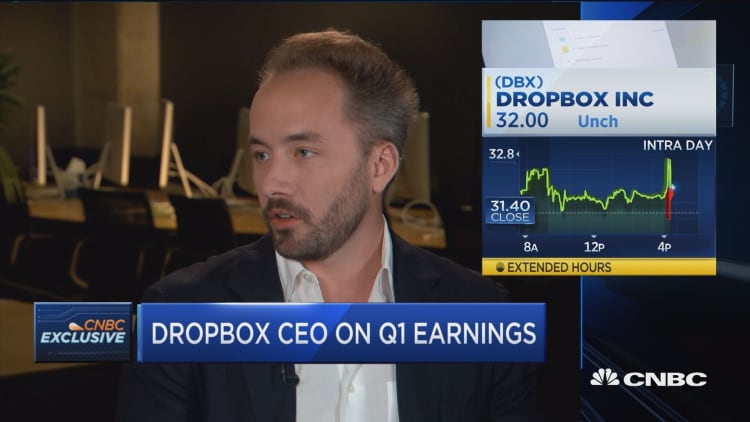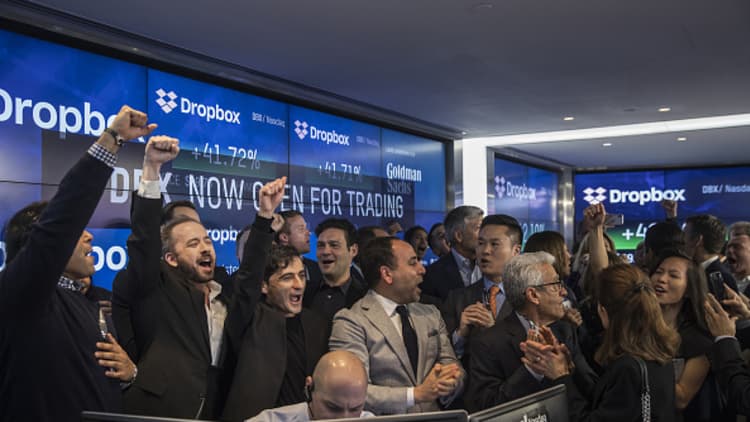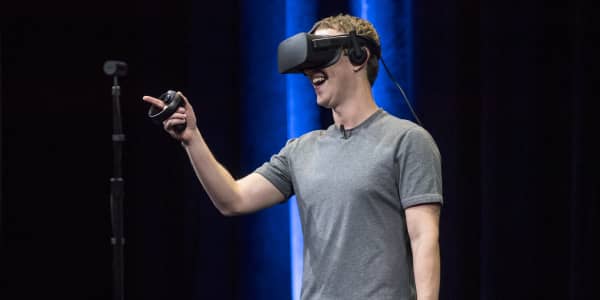
Dropbox stock fluctuated and then gradually fell after it reported better-than-expected first quarter results in its first earnings report as a public company on Thursday.
- Earnings: Excluding certain items, 8 cents per share vs. 5 cents per share as expected by analysts, according to Thomson Reuters.
- Revenue: $316.3 million vs. $309.2 million as expected by analysts, according to Thomson Reuters.
In its statement on Monday the cloud software company put year over year revenue growth at 28 percent.
With respect to guidance, chief financial officer Ajay Vashee said on the company's first-ever earnings call that Dropbox expects $328-331 million in revenue in the second quarter, and $1.343-1.355 billion in revenue for all of 2018. Analysts had been looking for Dropbox to forecast $324.9 million in revenue for the second quarter and $1.33 billion in revenue for the full year, according to Thomson Reuters. Dropbox did not provide earnings guidance.
Vashee did say the company thinks it will have $340-350 million in free cash flow for 2018, a number that's above the FactSet consensus estimate of 323 million.
Despite exceeding estimates, Dropbox saw its stock fall after Vashee gave the guidance.
In response to a question from JMP Securities' Greg McDowell about the advantages Dropbox gains from operating its own data center infrastructure to operate its storage and collaboration services rather than rely primarily on a public cloud like Amazon Web Services, CEO Drew Houston pointed to cost advantages and improvements in the company's profit margin.
Dropbox can also adjust its infrastructure to meet the needs of its workloads -- for example, it can keep files on different types of storage infrastructure based on how new it is, Houston said. In the long term, Dropbox can bring about product improvements and performance boosts, he said.
"As compute becomes a bigger part of our workloads, as machine intelligence becomes a more important part of that workload, having that flexibility to control every layer of the stack is a big advantage," Houston said. After the earnings call ended, Dropbox stock was down more than 5 percent from the closing price of $32 per share.
Heading into earnings, RBC Capital Markets analysts led by Mark Mahaney sounded optimistic about Dropbox in a May 4 note. "Our due diligence checks highlight very high customer satisfaction based on DBX's intuitive interface, ease of use and simplicity," they wrote.
In the first quarter Dropbox announced partnerships with Google and Salesforce. Partnerships like those "could serve as revenue tailwinds in the near and long," Mahaney's team wrote. At the same time, they acknowledged that the market where Dropbox does business is "highly competitive," with the likes of Microsoft, Box and Atlassian in addition to Google.
On Monday Dropbox said it had 11.5 million paying users in the first quarter. That disclosure implies around 500,000 new paying users, above the FactSet consensus estimate of 275,600, according to StreetAccount. The RBC analysts thought Dropbox would say it added 140,000 paying users in the quarter, for a total of 11.12 million, which would represent 23 percent growth from a year ago. Analyst Rishi Jaluria at D.A. Davidson put his paid user growth estimate at 22 percent in a May 8 note.
Dropbox said the average revenue it took in per paying user was $114.30, which beat the FactSet consensus estimate of $111.97, according to StreetAccount. Jaluria had predicted Dropbox would report $109.99 in average revenue per user for the first quarter, while the RBC analysts' estimate was $113.2 million. For the entirety of 2017, that figure was $111.91.
Dropbox stock started trading on the Nasdaq on March 23. The stock is currently about 1 percent above the debut price of $29 per share. In the same period, competitor Box's stock is up about 24 percent.






